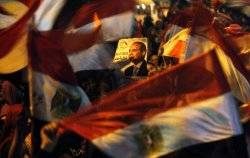Egypt's presidential election has been extended by one more day in an effort to boost low turnout that threatened to undermine the credibility of the vote likely to be won by the former army chief Abdel Fattah el-Sisi.
The decision followed lower-than-expected turnout in the originally two-day vote that was due to end on Tuesday night.
Electoral commission chief Abdel Aziz Salman put the turnout by the end of the second day at about 37 percent of the 53 million electorate, the official MENA news agency reported.
The military-backed government had launched a determined effort to get people to vote, declaring Tuesday a public holiday.
The Justice Ministry said Egyptians who did not vote would be fined, and train fares were waived in an effort to boost the numbers.
The vote, which began on Monday, pits Sisi against the left-wing candidate Hamdeen Sabahi, a former legislator and long-term Nasserist who came third in the 2012 election.
Sisi, who quit the army in March to run for president, led a coup that removed the nation's first democratically elected president, Mohamed Morsi, last July.
Extension criticized
The camps of both candidates criticized the election commission's move to extend voting and said they had filed complaints against it. An adviser to Sabahi said he would consider withdrawing from the race if his complaint was ignored.
Sabahi's campaign denounced the extension as an attempt "to prevent the Egyptians from expressing their opinion through manipulating the turnout rates and the voting percentages".
Samer Shehata, associate professor of Middle East Studies at the University of Oklahoma, told Al Jazeera he believed that voting had been extended in a bid to legitimise the election of Sisi, to show that "he has a mandate, that he really has widespread support among Egyptians".
Sabahi's office had also complained early on Monday that police and soldiers were refusing his representatives access to polling stations.
In one case, detailed in an email to journalists, the Sabahi campaign claimed that lawyer Ahmed Hanafi Abu Zaid of the campaign's legal committee was "brutally beaten" and arrested after trying to mediate in a dispute with another campaign delegate.
"He was later transferred to a military prosecutor's office," the campaign said.
The Muslim Brotherhood, to which Morsi belongs, had instructed its followers to boycott the vote. Also boycotting the polls were many of the pro-democracy youths who participated in the 2011 uprising against former President Hosni Mubarak.
In a report issued on May 16, the US-based Carter Centre expressed concerns about "the restrictive political and legal context surrounding Egypt’s electoral process, the lack of a genuinely competitive campaign environment, and the deep political polarization that threatens the country’s transition".
Dissidents in detention
Carter Centre representatives are among a number of international observers monitoring the polls, including the European Union.
Citing Human Rights Watch estimates, the Reuters news agency reported that the number of political dissidents and Islamists in detention in Egypt are more than 20,000.
The last year has been the bloodiest period of internal strife in Egypt's modern history, with hundred of Brotherhood supporters getting killed during protests while several hundred members of the security forces have also been killed by Islamists since last July.
The Brotherhood, declared a terrorist organization by the state, has described the vote as "the election of the presidency of blood".
The government accuses the group of orchestrating violence - a charge it denies.
In the rural province of Fayoum, south of Cairo, and in the city of Alexandria, both places where Islamists have strong support, voter queues were short throughout Monday.
Many of those who opposed Sisi said the election lacked democratic credibility.
Sisi won 95 percent of votes cast in advance by Egyptians abroad, but an opinion poll by the Washington-based Pew Research Centre suggests a more mixed picture, with Sisi viewed favorably by 54 percent and unfavorably by 45 percent.
As Sisi voted in Cairo on Monday, he waved to supporters, who shouted "President, president!"
"Today Egyptians are going to write their history," said Sisi.
It is the second time Egyptians are electing a president in two years. And it is the seventh vote or referendum since 2011.
PHOTO CAPTION
Supporters of Egypt's former army chief Abdel Fattah al-Sisi hold a poster of him and wave flags in Tahrir square in Cairo May 27, 2014.
Aljazeera


 Home
Home Discover Islam
Discover Islam Quran Recitations
Quran Recitations Lectures
Lectures
 Fatwa
Fatwa Articles
Articles Fiqh
Fiqh E-Books
E-Books Boys & Girls
Boys & Girls  Articles
Articles










